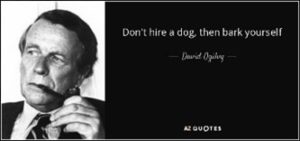Is your boss trying to infringe on your job? Are they micromanaging you and preventing you from achieving your business directives? If so, you could tell them, "don't keep a dog and bark yourself," as a way to ask them to give you some space. This post unpacks the meaning and origin of this expression.
Meaning
This proverbial saying means that you shouldn't pay someone to complete a task and then try to do the task yourself. When you're using "don't keep a dog and bark yourself," you're giving someone advice, telling them that they need to back off and let the person do their job.
Example Usage
"Why are you trying to do that? Didn't anyone ever tell you don't keep a dog and bark yourself?"
"You're a manager now, and you have subordinates that handle that so you can focus on other tasks. Don't keep a dog and bark yourself."
"There's no need to do that anymore; you have Cindy taking care of the campaign for you. Don't keep a dog and bark yourself, just let her do what she's good at."
"I was having a hard time letting go of my responsibilities with the business. My mentor told me that you don't keep a dog and bark yourself, so I took their advice and decided to go on vacation."
"I'm tired of you micromanaging your team. Don't keep a dog and bark yourself. Give them room to grow."


Origin
The origin of the expression, don’t keep a dog and bark yourself” comes from a book written by Brian Melbancke called “Philotimus: the Warre Betwixt Nature and Fortune. “ Published circa 1583, Melblancke’s work features the first iteration of the phrase that leads to the modern format of the saying.
“It is smal reason you should kepe a dog, and barke your selfe.”
The proverbial saying lost the archaic spelling over the years, resulting in it changing to the current form of “don’t keep a dog and bark yourself” sometime in the 1800s.
The most famous modern iteration of the saying comes from the legendary marketing genius David Ogilvy. Ogilvy used the iteration “Don’t hire a dog and bark yourself,” with the expression appearing in his 1963 book, “Confessions of an advertising man.”
Ogilvy used the phrase as a way to express that when hiring a marketing specialist to handle their campaign, shareholders and management need to get out of the way to experience success. Trying to control the process leads to interference that derails progress, making the investment in hiring a marketing specialist a moot point.
Phrases Similar to Don't Keep a Dog and Bark Yourself
- Don’t hire a dog and bark for yourself.
- Don’t do everything yourself.
- Sometimes we need a helping hand.
- Delegate don’t abdicate.
Phrases Opposite to Don't Keep a Dog and Bark Yourself
- You don’t need help with anything.
- A one-man band.
What is the Correct Saying?
- Don’t keep a dog and bark for yourself.
Ways People May Say Don't Keep a Dog and Bark Yourself Incorrectly
Some people may use the phrase in reference to dogs. The saying has nothing to do with these animals. The "dog" in the expression refers to a person capable of doing a job or a skilled person. So, using the phrase to describe dogs or animals is incorrect.
Acceptable Ways to Phrase Don't Keep a Dog and Bark Yourself
You can use the expression "don't keep a dog and bark for yourself" when you're trying to tell someone to delegate their responsibilities to someone else. It can mean holding onto something when you should be letting go.
The phrase suits social and professional use. You could use it at work to tell a manager to stop micromanaging their sales staff. You could use it at home to tell your partner to stop doing something like washing the car when they employ someone to do it at work.